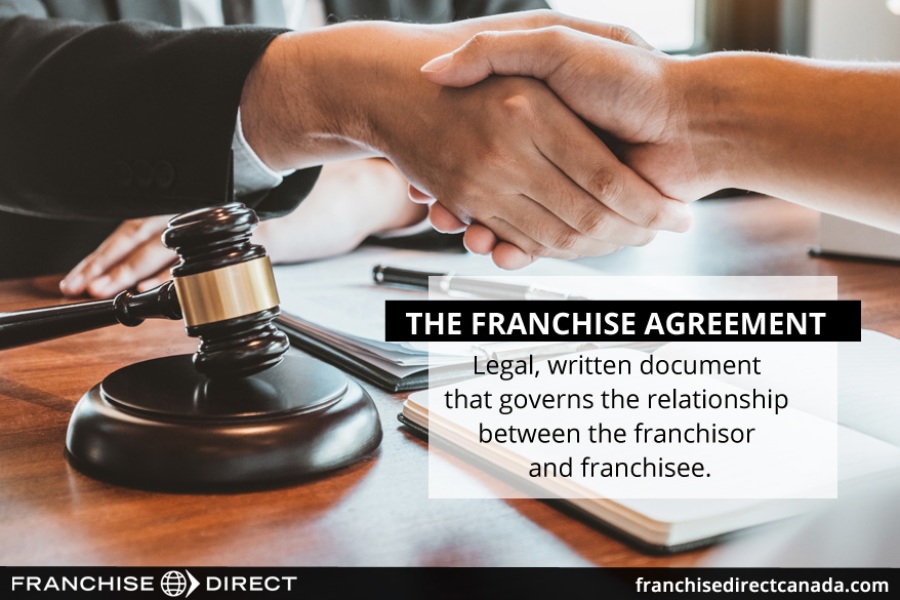🕒 Estimated Reading Time ~ 4 minutes

The franchise agreement is the foundation of the relationship between the franchisor and the franchisee.
It is the legal, written document that governs the relationship between the franchisor and franchisee. It specifies the terms of the franchise obligations such as rights and responsibilities of the parties, fees and payments, territory and duration of agreement.
Because the franchise agreement outlines the obligations of the franchisor and the obligations of the franchisee, it is extremely important to have a complete understanding of all its provisions so that both parties fully understand what is expected of them in regard to the business.
When reviewing a franchise agreement, here are some common elements you will find covered in detail within the paperwork:
- Fees. Generally detailed is how much you will be paying in regards to the franchise fees, royalty fees, and other additional costs. Of special note here is the schedule of late fees that may be applied if payments to the franchisor are past due.
- Intellectual property rights granted. The franchisor is giving the franchisee restricted license to use its logos, trademarks and business operating system for a given time period. The agreement will detail how these marks can be used.
- Training and operations. What training is provided for the franchisee and what training is the franchisee responsible for? In addition, the restrictions, limitations, and requirements involved in operating the business will be touched upon. The franchisor will also lay out what kinds of ongoing support the franchisee can expect.
- Franchise term length and specifications for renewal of the term. Delineated will be the opening date, as well as how long the franchise relationship will run for. Also noted will be if there are any franchisee rights for extending the franchise term and what requirements would have to be met.
- Conditions under which the franchise can be terminated. In what event can the franchisor shutter the franchise for poor performance or another reason? Is there a way for franchisees to remedy a default?
- Post-term requirements. After the term ends, either naturally or by default, the franchisor will have steps that need to be taken. These steps often include the returning of confidential materials, ceasing to use intellectual property, and the paying of outstanding fees. Franchisees should also get in writing if there is a non-compete period where the then-former franchisee is prohibited from working for certain companies for a specified period of time.

- Territory granted. Is your franchise an exclusive territory or does the franchisor reserve the right to open other locations as near as it wants? How is your territory determined? Is it by population numbers or geographical map? Is encroachment defined?
- Advertising and marketing. Carefully examine your obligations to contribute toward advertising and marketing, and what the franchisor will provide in return.
- Design and renovations. Franchisees must complete construction or renovations of their premises, if applicable, to the franchisor’s satisfaction. Make sure it is in writing whether the franchisor requires the use of specific suppliers. Sometimes renovations will be a condition of renewal.
- Minimum performance requirements, if applicable. Does the agreement impose a minimum performance requirement? If so, how much is it and for what period of time? What are the consequences of non-achievement of the minimum performance target (termination, non-renewal of the agreement)?
- Insurance requirements. Franchisees are solely responsible for obtaining and maintaining all the necessary insurance policies for the business. However, if the franchisee fails to obtain adequate insurance, the franchisor can obtain it and charge the franchisee for it.
- Indemnification: An outline of how the franchisee would pay back the franchisor for any action the franchisee takes that causes damage to the franchisor’s brand.
- Casualty. Usually franchisors have defined processes about what needs to occur if a business location sustains major damage that effects regular operation.
- Contingencies in the event of death or incapacity. It’s morbid, but all business owners must plan for unexpected circumstances and the possibility of catastrophic events. If you should die, will your spouse or any other family member be entitled to take over the business?
While franchise agreements are fairly standardized—franchising is based upon replication of a system after all, some franchisors are open to negotiating elements of their franchise agreement. If a franchisor does agree to slightly alter certain terms, it's paramount that these are spelled out within the agreement.














